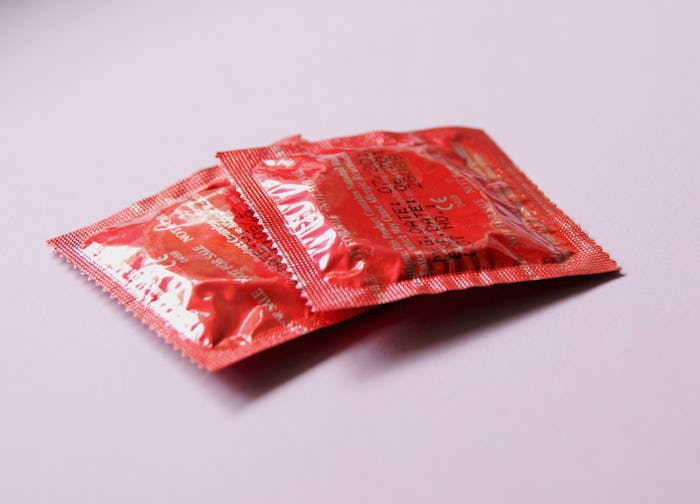One of the great modern miracles of the last century has been the introduction of birth control. It's changed the way society views sex and has made having safe sex much easier for both men and women alike. If you're sexually active, there's a good chance you're using some kind of birth control. And unless you're trying to get pregnant, you should be using some kind of birth control. But even though birth control has changed the world of sex, it's important to pay attention to methods, because there are ways you're making your birth control less effective.
What good is birth control if you're counteracting its effectiveness? A hell of a lot less effective than it states on the packaging it comes in. A condom is no longer 98 percent effective if you're not using it properly. And when you treat it as though it is still as effective as it claims to be, you're putting yourself (and your partner) at risk. So do yourself a favor and take a look at the ways you could be making your birth control less effective, so that you're not relying on a form of birth control that's become faulty in your hands.
1You Forget To Take Your Pill
If you forget to take your pill, it only makes sense that it would become less effective. Depending on what type of pill you're on, there are different ways to handle forgetting a pill. Planned Parenthood has a chart describing what to do if you miss a pill, depending on which type of pill you're on. Regardless of which kind of pill you're taking, forgetting to take it puts you at a higher risk of contraception. If you can't seem to remember your pill, talk to your doctor about a different birth control method that doesn't require you to remember every single day.
2You Don't Take Your Pill At The Same Time Every Day
The bottom line is this: it is important for you to take your pill at the same time everyday. According to Fusion, your pill contains hormones, and altering your hormone levels on a daily basis with a contraceptive pill should be regulated and consistent. If you're not consistent, it can effect your body in more ways than one. Including making your contraceptive less effective.
3You Try To "Double Up" On The Pill
Physician Harry Lodge told Self that you should be OK if you miss one day and double up the next. Lodge recommends reading the label, as most of them tell you what to do in case you've missed a pill. However, Lodge goes on to say that missing two or more pills in a row can raise your contraception risk to 8 percent, rather than the 1 percent that most contraceptive pills promise.
4You Store Your Birth Control In The Wrong Place
If you don't have a specific place for your pill, find one. You'll be more apt to remember to take your pill if it becomes a part of your daily routine. And other birth control methods, such as condoms and the Nuvaring, should be stored in cool, dry places, away from sunlight. If either method is left in the sun, you should consider finding another method.
5You're Taking Counteractive Medication
Although the big myth is that antibiotics make your pill less effective, there's only one known antibiotic that can counteract your pill — rifampin. However, Planned Parenthood notes that other non-antibiotic medications can make your contraceptive pill less effective, so it's important to ask your doctor before going on any medication how it will effect the efficacy of your birth control.
6Your Condoms Are Ancient
Always check the expiration date on your condoms before use. A representative from Planned Parenthood told Marie Claire that expired condoms are less flexible, and more likely to break. A broken condom means a birth control crisis.
7You Had Sex Without A Backup Method Just After Starting The Pill

Depending on where you are in your cycle when you start taking the pill, you could be putting yourself at risk. Oncologist Michael Armstrong told Everyday Health that if you're starting contraceptive pills in the middle of your cycle, that you should use condoms for at least seven days after you start the pill.
8You Rely On One Method Of Birth Control
No one method of birth control is 100 percent effective, which is why a combination of more than one method is usually the best way to prevent an unplanned pregnancy. The Center for Disease Control has a chart that compares the methods of effectiveness, and recommends that condoms always be used to prevent the risk of sexually transmitted infections.
9You're Using The Wrong Lube
If you're using an oil or petroleum based lubricant while your partner's wearing a condom, you're not doing yourself any favors. Oil and petroleum based lubricants can deteriorate latex condoms, making them way less effective. A water based lubricant is your best bet. It's safe to use with condoms, it's easy on your sex toys, it won't stain your sheets, and because it's water soluble, it won't mess with the pH of your vagina.
10You Don't Time Your Sponge Removal Correctly
In order to be effective, contraceptive sponges should be removed no sooner than six hours after intercourse, and should not be left in for more than 30 hours total, according to Planned Parenthood. Removing the sponge before the recommended time will lead to decreased effectiveness, and removing it after can lead to a yeast infection.
11You're On The Wrong Pill
Finding the right pill for you is important, because birth control pills are not one size fits all. "Choosing between birth control pills is more of an art than a science,” Alison Edelman, a clinical gynecologist, told Health. Some pills will have a higher efficacy rate for you than others, depending on what it is you're looking for. Talk to your doctor to find the best pill for you.
